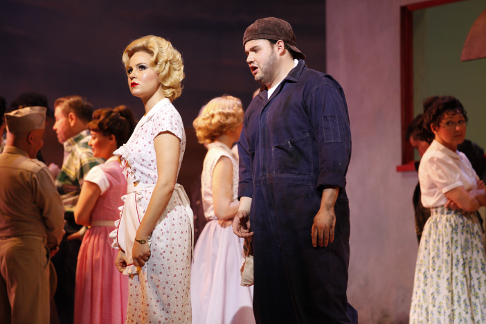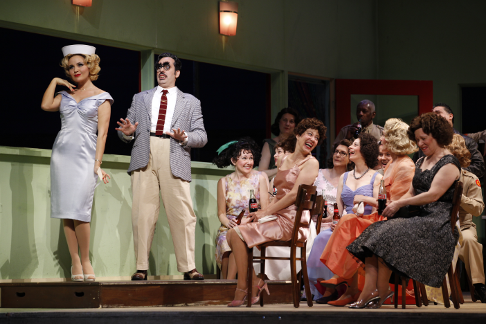04 Apr 2011
L’Elisir d’Amore
Donizetti described to his father the premiere cast of L’Elisir in terms of lukewarm praise—the tenor only “passable” the soprano’s voice “pretty” and the bass “a little hammy.”

Donizetti described to his father the premiere cast of L’Elisir in terms of lukewarm praise—the tenor only “passable” the soprano’s voice “pretty” and the bass “a little hammy.”
(Doubtful, though, is Emilia Branca’s tale that Donizetti complained of a Dulcamara with a “voice like a goat.”) Notwithstanding the shortcomings of the singers, the score won the day.
Could it have been otherwise? L’Elisir is so ingenious, so bubbly, so amusing—and at the same time so moving and heartfelt—that it proved a huge and instantaneous success. It charged confidently into the international repertory and never lost steam. Nearly two centuries later, it’s still almost impossible to botch L’Elisir beyond redemption. And so it is with New York City Opera’s production: carried by Donizetti’s brilliant music, Romani’s witty and singable verses, an attractive production, and a much more than “passable” tenor, the performance I attended delighted even as it disappointed.
To a modern audience, the American Southwest during the 1950s seems a remote and idyllic time, and Jonathan Miller’s 2006 production therefore neatly fit the spirit of the piece; every detail was skillfully thought out and Isabella Bywater’s sets and costumes were a delight. The locus is Adina’s Diner, the gathering place of choice for a desert community near a military base. Dulcamara rolls up to the gas pumps in a vintage hotrod, sporting spectator shoes; Nemorino wears mechanics togs; the chorus consists of greasers, fry cooks, soldiers and women in poodle-skirts and cat-eyed glasses. Adina is a sort of Marilyn Monroe, Giannetta a less prominent Maureen O’Hara. Belcore struts around in a Marine uniform and indulges in Elvis-like pelvic gyrations.
The direction of this revival left much to be desired, and seemed motivated more by a desire for cheap laughs than by an understanding and appreciation of the text. As Donizetti’s biographer William Ashbrook observed, the most groundbreaking feature of L’Elisir is that it is not mere slapstick, and its lieto fine occurs because Adina realizes Nemorino’s true goodness and sincerity; L’Elisir succeeds because there is real emotional depth here.
With all this in mind, let it be admitted that Nemorino is not the sharpest knife in the drawer; but for Romani he is a gullible, uneducated country lad with a big heart. In the Miller production he is painted as borderline developmentally disabled. He claps gleefully, jogs in place, bats imaginary balls and jumps up and down as if he were five years old, much of the time wearing a dopey expression. In line with disturbing current trends, excessive stage action often interferes with some of the most important musical and dramatic moments. During Adina’s solo in “Chiedi all’aura lusinghiera,” Nemorino unwittingly spills salt, tossing handfuls around as Adina tries frantically to clean it up. During her duet with Dulcamara (dramatically the turning point of the opera), Adina reaches so deeply into his pocket that his expression plainly tells us where her hand has wandered. In the women’s chorus that begins Act II, a toilet flushes as they stand in line waiting for the restroom, provoking a few nervous scatological giggles; later Nemorino, sickened by his excessive consumption of the “elixir,” runs to the same bathroom to be sick.
 Stefania Dovhan as Adina and David Lomelí as Nemorino
Stefania Dovhan as Adina and David Lomelí as Nemorino
This is all a shame, but even this cloud of directorial dust, tenor David Lomeli was able to show Nemorino’s passionate nature, his innocence and his vulnerability. Indeed, only his artistry raised the afternoon out of vocal mediocrity. Lomeli never lost sight of what makes Nemorino such a sympathetic character, even as he acted the fool. He sang a wistful “Quanto e bella,” and his impassioned solo passage, “Adina, credimi,” in the first act finale tugged at the heartstrings. An achingly tender, beautifully shaped “Una furtiva lagrima” earned him the loudest cheers of the evening. Lomeli has a lovely, light voice with varying colors and a good sense of how to use dynamic shading; there is a beautiful, genuine Italianate squillo there too. He warmed up quickly after a slightly underpowered start, and hit his stride with full confidence by the time of his duet with Dulcamara.
As Adina, Stefania Dovhan was less than ideal casting. She is physically very attractive, and the voice is intermittently beautiful and expressive, but on the whole it is too harsh and inflexible for the role. Her voice doesn’t have much color; her acuti, while on pitch, were rather grating, and she does not handle coloratura cleanly. Though there were isolated moments of real feeling, for the most part it was a flat, rather riskless portrayal; the shift from fickle and vindictive vixen to loving fiancée was a bit too abrupt and not very convincing.
 Stefania Dovhan as Adina and Marco Nisticò as Dulcamara
Stefania Dovhan as Adina and Marco Nisticò as Dulcamara
As for José Adán Pérez’s Belcore and Marco Nisticò’s Dulcamara, all their comic silent-movie face-pulling and pelvic thrusts couldn’t hide the fact that they sounded vocally undernourished and fudged the coloratura. In his duet with Lomeli, Nisticò’s vocal line drowned beneath his partner’s. Brad Cohen conducted a brisk if at times somewhat hurried performance. The orchestra sounded marvelous but for one horn mishap. The chorus was well-rehearsed and in fine form.
Daniel Foley